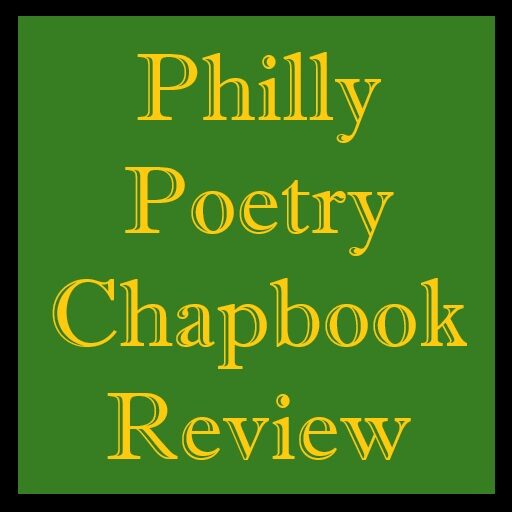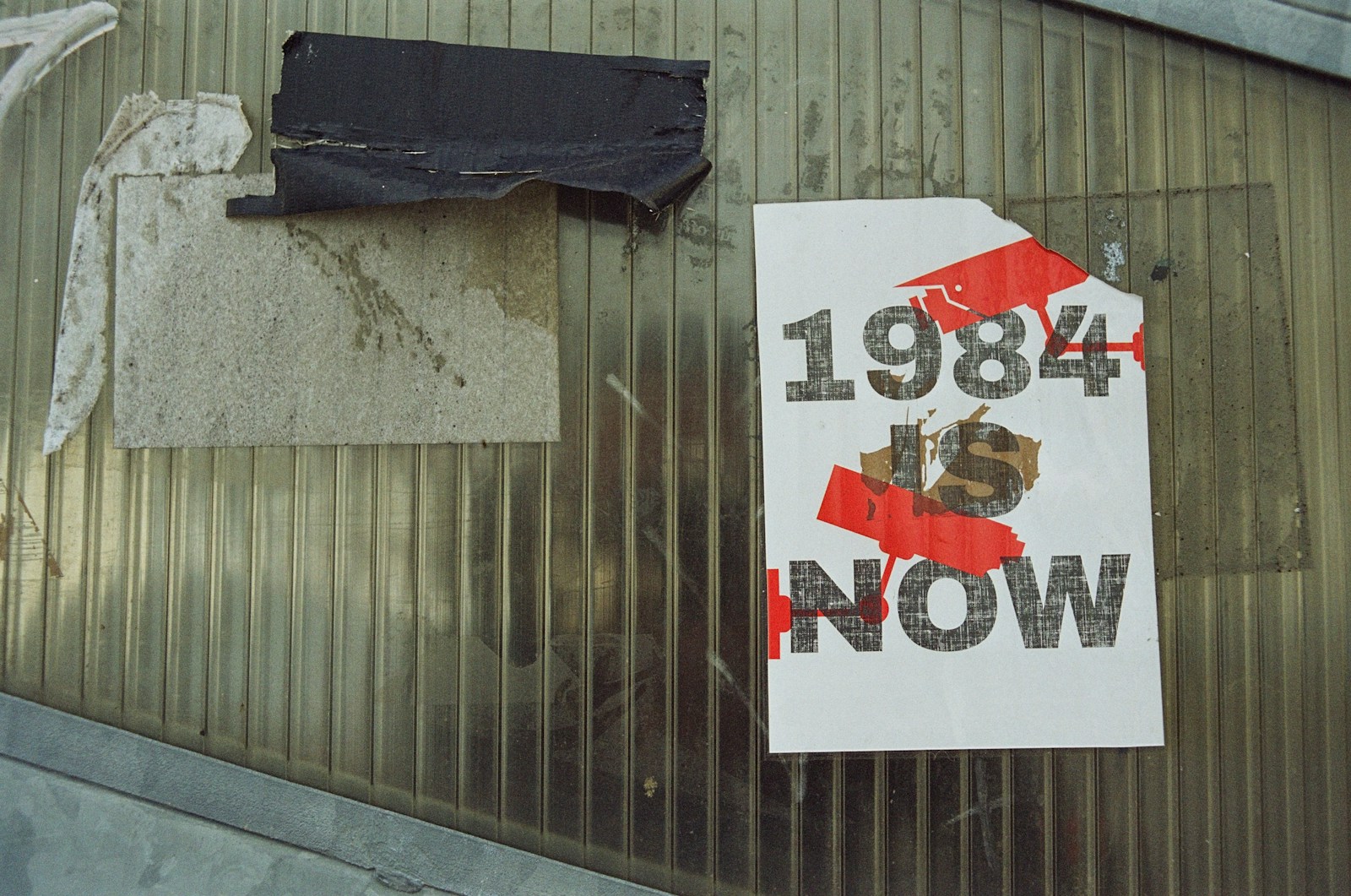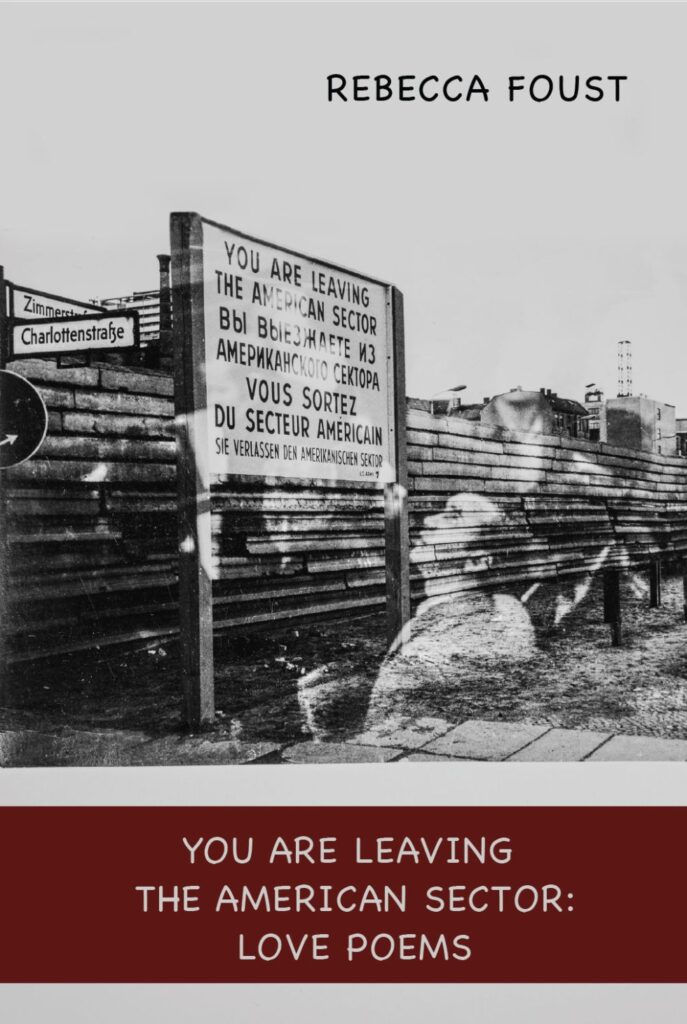YOU ARE LEAVING THE AMERICAN SECTOR: Love Poems
Rebecca Foust
Backbone Press, 47pp., $10.00
Rebecca Foust’s new chapbook of poems has a strange prescience. Conceived while rereading George Orwell’s 1984 during the pandemic, it frames the first Trump administration in the context of that novel’s world of mass manipulation via thought control, Newspeak, and hatreds assigned for the purpose of enforced obeisance to Big Brother. Arriving just prior to Trump’s election to a non-consecutive second term, You Are Leaving the American Sector: Love Poems also writes history forward.
Foust isn’t alone in making the obvious connection between Trump’s first term and Orwell’s dystopia. While comparisons to mid-20th century fascism seemed more hyperbolic at the time, they feel knowing with the early days of Trump’s second term featuring the establishment of camps for deportees, open dreams of annexing Canada, and the alarming return of fascist salutes in public life. The administration’s assertion, contrary to clear evidence, that Ukraine started the war with Russia seems to mirror the fictional dystopia.
But Foust doesn’t rest on easy comparisons. Poems in the collection, which takes its name from the sign at Checkpoint Charlie in West Berlin during the Cold War, holds an authoritarian regime’s feet to the fire on its many lies and violations of democracy and decency, with an eye to how Trump exploited language and silence to convince over half the electorate that he’s the nation’s great savior. It’s a modern J’Accuse written in verse.
Like 1984, these poems tell a love story and the saga of a person fashioning a future from a demolished past. The early poem “Prologue: Water” introduces us to a world in which all water is held in “State cisterns.” Against a landscape of concrete and ruins, its inhabitants, under the eye of Big Brother, suffer devastation and loss:
We used
to have inner rooms to retreat to,
but now every wall is a screen
with a lens looking in.
The narrator, an alter ego of 1984’s Julia, refers to both nature’s fluidity and its absence throughout the collection. The speaker of “Plague,” a poem set during COVID lockdown, is overwhelmed by birds arriving “like leaves in wind” at a newly-hung bird feeder. The onslaught makes her feel small, “one cell in a body / one word in the Iliad.” She’s reminded of the pandemic’s frightful death toll in its early months with “the nightly knell of names / read aloud,” and borrows the line “I had not thought death had undone so many” from the “The Burial of the Dead” section of T.S. Eliot’s classic poem, “The Waste Land.”
Foust lays out the tenants of contemporary Newspeak in the book’s first section, “World State of Ford 632 / USA 2016-24.” The poem “Where This Is Leading” begins with an epigraph from Orwell’s novel: “Who controls the past… controls the future: who controls the present controls the past.” It describes the pride Julia’s soon-to-be-lover Winston Smith takes in revising history at the Ministry of Truth as well as the mechanism of the Big and Small Lie:
when our leader
tells obvious lies, even small ones,
it teaches us to mistrust our own senses & frays
the fabric of our shared reality—
The poem “Rally Insurrection” playfully illustrates the work of the Ministry of Truth–tellingly renamed Truth Social in a headnote. The poem is an edited newsbrief on the January 6 attack on the U.S. Capitol:
They peacefully assembled at stormed the Capitol Building,
carrying cell phones & water bottles guns, pipe bombs, Molotov
cocktails, knives, axes, lead pipes, bats, chemical sprays,zip ties, & rope used to erect a gallows.
This crossed-out arsenal echoes the litany in Bob Dylan’s song “Jokerman,” which prefigures our contemporary landscape with “[n]ightsticks and water cannons, tear gas, padlocks / Molotov’s cocktails and rocks behind every curtain.” The poem that follows, “Language Matters,” shows how subtle adjustments to diction and line break strategically distort meaning, and how insidious events like January 6 create silence born of confusion.
The book’s second section, “Julia & Winston,” shifts focus to the lovers’ subversive relationship, describing a small private world of resistance. Much of it is told from Julia’s perspective, beginning in “How It Begins” with the artificial source of nature in Winston’s initial overture:
He picks posies for her
on his portable telescreen,
with captions like
lovelies for the lovely.
Winston eventually turns to verse, repeatedly reading poems to Julia until he can recite them “verbatim.” In “Another Life,” Julia’s dream world becomes more active in its retreat from the concrete and confusion surrounding her:
In another life, I am home
to plant & weed & pick, my fruit
does not rot on the tree
“I swim & swim & swim,” says the speaker, and praises this other life, concluding, “In it, I am not ashamed.”
Nature imagery flourishes as Julia’s imagination becomes her reality, one defined by visions such as the patterns of light in a hideaway room with “the white rhomboids of moon / thrown on the bare floorboards” in “promise me.” The speaker of “Shine & Blur” narrates Julia’s dream memories of the time prior to going into hiding, cleaving to her prologue’s conceit. “In my dream, I do not shy / away when you lean in,” she says in gorgeous verse, concluding,
I remember kissing you before—
in the hedgerow, on the shore, on the threshold
of a door opening to everything—break & release
released in a river, then all blur & shine, shine & blur.
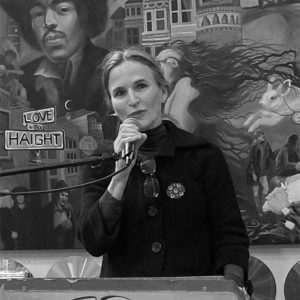
The concrete world comes crashing back in the book’s third section, “Leaving the American Sector,” with the demise of the lovers’ escape. The speaker’s anger is raw and unmitigated, especially in a suite of poems dealing with the subjugation of women and restrictions to abortion access. She innumerates familiar threats to women’s agency and health–some torn from the headlines–closing with sardonic humor in the third of a poetic triptych; a Dick and Jane primer headed with an epigraph quoting President Trump: “It’s a very scary time for young men in America.”
The section closes with one more litany in “Here, The Worst Did Not Happen,” a poem confronting an electorate that puts corrupt politicians into office, while living comfortably compared to the devastated populations of Ukraine and Gaza. It is a comfort that may well be clocking out, given the permanent presence of Big Brother—a phenomenon identified by Orwell and a garish symptom of America’s structural societal problems that will not culminate with Donald Trump.
In parts of the collection, narrative and imparting information seem to take priority to versification, but the wonder of You Are Leaving the American Sector is that it maintains poetic integrity while conveying complex narrative, lists, and streams of information across its three sections.
Foust uses Orwell’s novel as a template, but her collection remains focused on our times; on what we’ve seen, what we’re seeing, and what we will see in an America lurching toward oligarchy. The story is her own, managing to rise as personal testimony amidst the familiar chaos and crisis. One would not need to re-read 1984 to fully engage with Foust’s urgent reckoning.
About the Author
Rebecca Foust‘s fourth full-length book, ONLY (Four Way Books 2022), earned a starred review from Publishers Weekly. Previous titles include Paradise Drive, God, Seed, and All That Gorgeous Pitiless Song (with artist Lorna Stevens). Rebecca’s poems won the 2024 James Dickey Prize, the 2023 New Ohio Review Prize, and in previous years, the James Hearst Prize, the Poetry International Prize, and the Pablo Neruda Award. Other recognitions include fellowships from The Frost Place, Hedgebrook, MacDowell, and Sewanee, and a Marin County Poet Laureateship. Rebecca was born in Altoona, Pennsylvania and now lives in northern California and northern Minnesota.
Contributor Bio
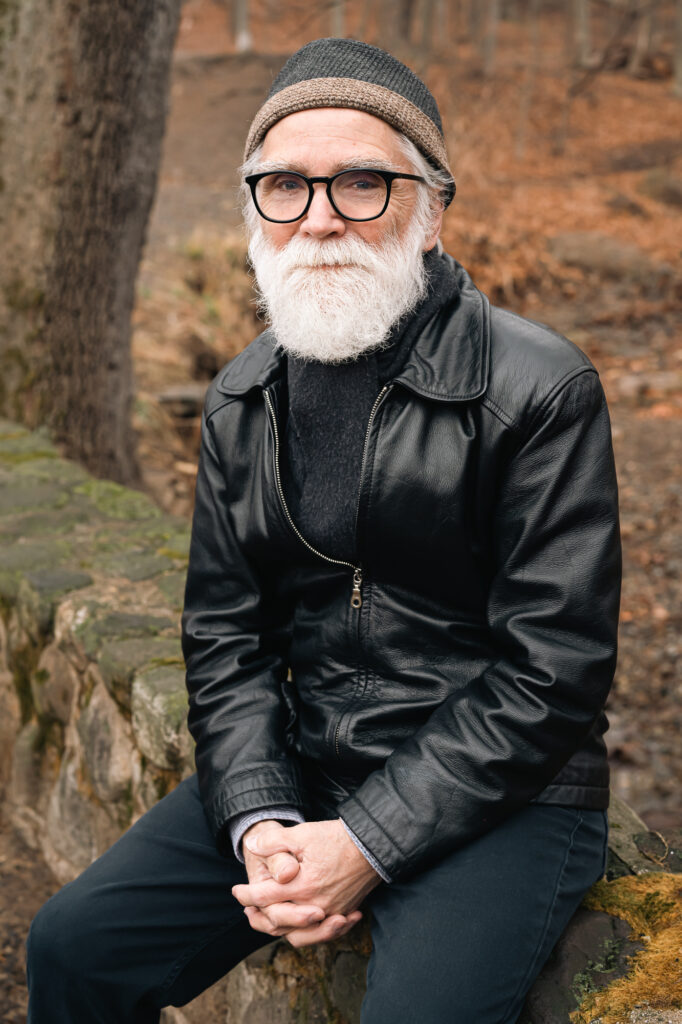
Rick Mullin is a painter and poet living in Northern New Jersey. His books include Soutine (Dos Madres Press, 2012), Huncke (second edition, Exot Press, 2021), and Grotesque Singers (Dos Madres Press, 2025).

Contents
Book Excerpt: The Prize of Québec by Jennifer Nelson
“I tend to lean into the transconstitutory powers of ekphrasis. … Only in poetry can one go to the moon in a way that critiques the quest for the moon.” Read a poem from Jennifer Nelson’s new collection from Fence Books, On the Way to the Paintings of Forest Robberies.
Chapbook Poem: This Is How They Teach Us How to Want It . . . by Shanta Lee
“This poem explores the levels of our participation in handing ourselves over, often to the people, places, or things that deserve no such delight.” Read a #poem from Shanta Lee’s new book from Harbor Editions, This Is How They Teach Us How to Want It . . . The Slaughter.
Three Poems by Jonathan Fletcher
“Instead of having to choose between religion or the LGBTQ community (which I know many member of the latter feel they have to do), I think it is possible (and maybe even biblical) to integrate both into one’s life.” Read three original poems from Jonathan Fletcher, along with words from the author.
What Happened? On You are Leaving the American Sector by Rebecca Foust
“Rebecca Foust’s new chapbook of poems has a strange prescience. … Foust isn’t alone in making the obvious connection between Trump’s first term and Orwell’s dystopia.” Read the full chapbook review by new contributor Rick Mullin.
‘What if we started creating together? What if we looked at who we are from the side and saw a much more complete and honest perspective?” Read four poems by poet Sarah E N Kohrs, along with words from the poet.
Book Excerpt: Challenger by Colleen S. Harris
“If we look beyond the voyeuristic tendency to focus on the tragedy, what might we see? This poem was a chance for me to zoom in on the calm before the storm.” New poem from Colleen S. Harris’s new book from Main Street Rag, The Light Becomes Us, along with words from the poet.
Chapbook Poem: What I Did This Summer by Elinor Serumgard
“I love New Year’s and the promise of a new start, but I like to remind myself that you can start fresh at any point throughout the year.” New poem from Elinor Serumgard’s chapbook from Bottlecap Press, Analogous Annum, along with words from the poet.
Four Poems by Christa Fairbrother
“Since women aren’t allowed the power of our anger, we take it out on each other, and that’s what this poem is hinting at.” Read four poems by Christa Fairbrother, along with words from the poet.
Multilingualism and Metaphor: On Desire/Halves by Jaia Hamid Bashir
“Bashir’s elegant debut collection investigates identity as the result of choices between individual appetites and cultural frames. … [It] announces an exciting addition to the global chorus of contemporary literature.” Read D.W. Baker’s full review.
Five Poems by Jane Ellen Glasser
“In my fantasy world, I would be able to communicate with the animals I see every day.” Read five naturalist poems by poet Jane Ellen Glasser, along with a few words from the poet.
Book Excerpt: Ars Poetica by Leigh Sugar
“[C]ould there be, a poetry that does investigate the body, without explosion? Maybe even with an effort towards reconstruction?” Read an excerpt from Leigh Sugar’s book, FREELAND, from Alice James Books, along with words from the author.
“…she has a sense of style, a modicum of grace, and she recognizes her place in the cosmic order, where revolution rules every other Wednesday and twice, of course, on Sundays…” Read three poems by Bart Edelman along with words from the poet.
Chapbook Poem: I Worry by Flavian Mark Lupinetti
“I can’t begin to imagine doctors in Gaza courageously practicing medicine while intentionally targeted by the Israeli army aided by the United States.” Read the featured Chapbook Poem of the Month for June 2025, “I Worry” from The Pronunciation Part by Flavian Mark Lupinetti.
“Quantum physics leads us to the uncanny and the terrifying. I know people fear black holes, but to me they rearrange our relationship to time and to our own lives.” Read four #poems by Victoria Korth along with words from the poet.
